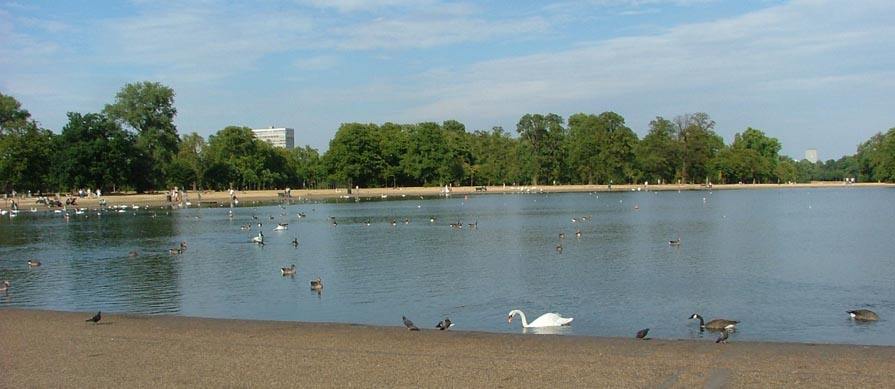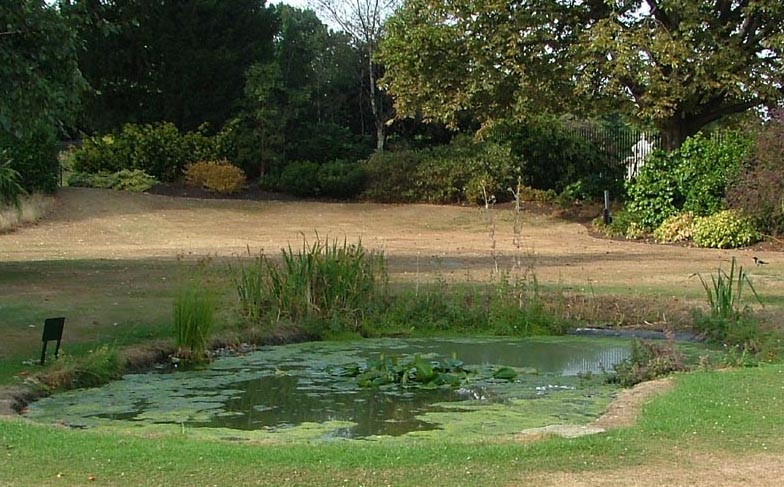Hyde Park and Kensington Gardens
From Londonbirders
Hyde Park and Kensington Gardens (open dawn to dusk) are located in the heart of Inner London (City of Westminster and Inner London Sector) and are easily accessible by the many public transport routes that take in the general area. Both sites, though technically seperate, are contiguous and are divided from each other by West Carriage Drive (the bridge). The home to the original Crystal Palace, Speaker's Corner, Kensington Palace, The Serpentine Gallery, George Frampton's much loved Peter Pan sculpture, the Albert, Hudson and Diana Memorials, The Speke Monument and Physical Energy, plus many famous concerts and events. The site (as with many within Inner London) is heavily utilised by the general public and comprises open and amenitised grassland dotted with wooded enclosures, more formal areas, small patches of rough grassland, a lake (The Serpentine in Hyde Park and The Longwater in Kensington Gardens) and The Round Pond (also in Kensington Gardens), long known for its model boat sailing on Sundays.
The Round Pound in Kensington Gardens (photo by Andrew Self)
Some decent local birding can be had with a bit of luck and much regular watching. The 625 acres (combined) have had a lengthy birdwatching history reflected in a species list that currently stands at 188. There is no waterfowl collection here though the occasional bird turns up attributable to one of the nearby collections (St. James' Park and Regent's Park).
Early morning is always best for birding purposes, before any potential disturbance kicks in, and interesting local/London species to have so far occurred have included : Bewick's and Whooper Swan, Garganey, Long-tailed Duck, Common Scoter, Goldeneye, all three sawbills, Red-throated Diver, Red-necked, Slavonian and Black-necked Grebe, Storm and Leach's Petrel, Little Egret, Gannet, Shag, Red Kite, Osprey, Merlin, Peregrine, Water Rail, Corncrake, Avocet, Sanderling, Little Stint, Bar-tailed Godwit, Whimbrel, Curlew, Greenshank, Green Sandpiper, Arctic Skua, Mediterranean, Little, Ring-billed, Yellow-legged, Iceland and Glaucous Gull, Kittiwake, Little and Black Tern, Guillemot, Razorbill, Little Auk, Turtle Dove, Short-eared Owl, Nightjar, Hoopoe, Shore Lark, Woodlark, Blue-headed Wagtail, Nightingale, Grasshopper and Marsh Warbler, Firecrest, Red-backed Shrike, Hooded Crow, Twite and Snow Bunting. The vast majority of these species are unlikely to be found on any ad-hoc visit and many of the more interesting records are from past decades. However, regular watching should repay with uncommon local species now and then.
This pond in Kensington Gardens is home to Small Red-eyed Damselflies (photo by Andrew Self)
Residents and regulars include the most significant Inner London population of Mute Swan (occasionally numbering 100+), Mandarin, Gadwall, Shoveler, Pochard, Tufted and Ruddy Duck, Little and Great Crested Grebe, Sparrowhawk, Kestrel, Stock Dove, Ring-necked Parakeet, Tawny Owl, Green and Great Spotted Woodpecker, Song and Mistle Thrush, Goldcrest, Long-tailed and Coal Tit and Nuthatch and Treecreeper. Migrant breeders include House Martin at the periphery of the site and Blackcap. A fair range of passage migrants can be expected annually such as Common Sandpiper, Common Tern, Skylark, the three regular hirundines, Tree and Meadow Pipit, Yellow and White Wagtail, Common Redstart, Whinchat, Northern Wheatear, Fieldfare, Redwing, warblers (including the occasional Wood), Spotted and Pied Flycatcher (the former no longer breeding), Jackdaw, Brambling, Siskin, Lesser Redpoll and Reed Bunting. Furthermore, in most years there are records of species such as Wigeon and Pintail which pose questions regarding origins. Some examples are undoubtedly wild, others less likely to be so. There are also regular records of Red-crested Pochard which are always considered to be of dubious provenence.
The whole site is a typical, though well managed, urban park.
PatchList 2006
A total of 108 species over 165 site visits was the highest total ever recorded for the site/s in any single year. Highlights included 8 Wigeon (including 5 drakes) on December 26th, fem/imm Goldeneye on December 20th, two records of Common Buzzard comprising two west on May 3rd and a single north on November 4th, a single Common Snipe flushed on October 13th, Woodcock on March 23rd, two records of Curlew comprising one NW on April 5th and one NE on April 23rd, Green Sandpiper on August 17th, a moulting 1st-summer Mediterranean Gull (colour-ringed) on July 4th (an overdue site first), an interesting 'Yellow-legged' Gull between March and the end of the year that sparked a considerable amount of debate regarding its racial identity (variously punted as a michahellis, an atlantis and a possible michahellis hybrid), single Turtle Dove SW on September 12th, calling Cuckoo on May 3rd, a male Lesser Spotted Woodpecker on both September 20th and October 10th, an intriguingly plumaged male Common Redstart (showing much white in secondaries) on April 18th, two records of Ring Ouzel comprising two males on April 17th and a juvenile bird on October 16th (the first records for Hyde Park, though previously recorded at Kensington Gardens), singing Wood Warbler on April 24th, two records of male Pied Flycatcher on April 15th and April 19th and a single Rook over on March 23rd. Other species included Shelduck, Teal, a total of three Hobby, Peregrine, Lapwing, Yellow-legged Gull, breeding Tawny Owl, Kingfisher, Tree Pipit, two Whinchat, a good autumnal showing of Spotted Flycatcher, Nuthatch, Treecreeper, Jackdaw, a single female House Sparrow (a park rarity these days), Brambling, Lesser Redpoll, Bullfinch and Reed Bunting.
PatchList 2007 Running Total
As at May 23rd my site total for the year stands at 93 species, as follows:
Little Grebe ~ Great Crested Grebe ~ Cormorant ~ Little Egret ~ Grey Heron ~ Mute Swan ~ Greylag Goose ~ Canada Goose ~ Egyptian Goose ~ Shelduck ~ Mandarin ~ Gadwall ~ Teal ~ Mallard ~ Shoveler ~ Pochard ~ Tufted Duck ~ Ruddy Duck ~ Red Kite ~ Sparrowhawk ~ Common Buzzard ~ Kestrel ~ Peregrine ~ Moorhen ~ Coot ~ Lapwing ~ Whimbrel ~ Common Sandpiper ~ Mediterranean Gull ~ Black-headed Gull ~ Common Gull ~ Lesser Black-backed Gull ~ Yellow-legged Gull ~ Herring Gull ~ Great Black-backed Gull ~ Common Tern ~ Feral Rock Dove ~ Stock Dove ~ Woodpigeon ~ Collared Dove ~ Ring-necked Parakeet ~ Cuckoo ~ Tawny Owl ~ Swift ~ Kingfisher ~ Green Woodpecker ~ Great Spotted Woodpecker ~ Lesser Spotted Woodpecker ~ Sand Martin ~ Swallow ~ House Martin ~ Meadow Pipit ~ Yellow Wagtail ~ Grey Wagtail ~ Pied Wagtail ~ Wren ~ Dunnock ~ Robin ~ Stonechat ~ Wheatear ~ Blackbird ~ Fieldfare ~ Song Thrush ~ Redwing ~ Mistle Thrush ~ Sedge Warbler ~ Reed Warbler ~ Lesser Whitethroat ~ Garden Warbler ~ Blackcap ~ Chiffchaff ~ Willow Warbler ~ Goldcrest ~ Long-tailed Tit ~ Coal Tit ~ Blue Tit ~ Great Tit ~ Nuthatch ~ Treecreeper ~ Jay ~ Magpie ~ Jackdaw ~ Carrion Crow ~ Starling ~ Chaffinch ~ Greenfinch ~ Goldfinch ~ Siskin ~ Linnet ~ Lesser Redpoll ~ Bullfinch ~ Reed Bunting.
Non-countables/Escapes/Hybrids etc:
Black Swan ~ Greylag Goose x Canada Goose ~ Emperor Goose ~ Barnacle Goose ~ Red-crested Pochard ~ Aythya hybrid (Scaup x Tufted Duck) ~ Pheasant.
2007: Site Visits :
Jan : 13 / Feb : 12 / Mar : 21 / Apr : 13 / May : 6 / June : 0 / July : 1.
D.T.McKenzie.


